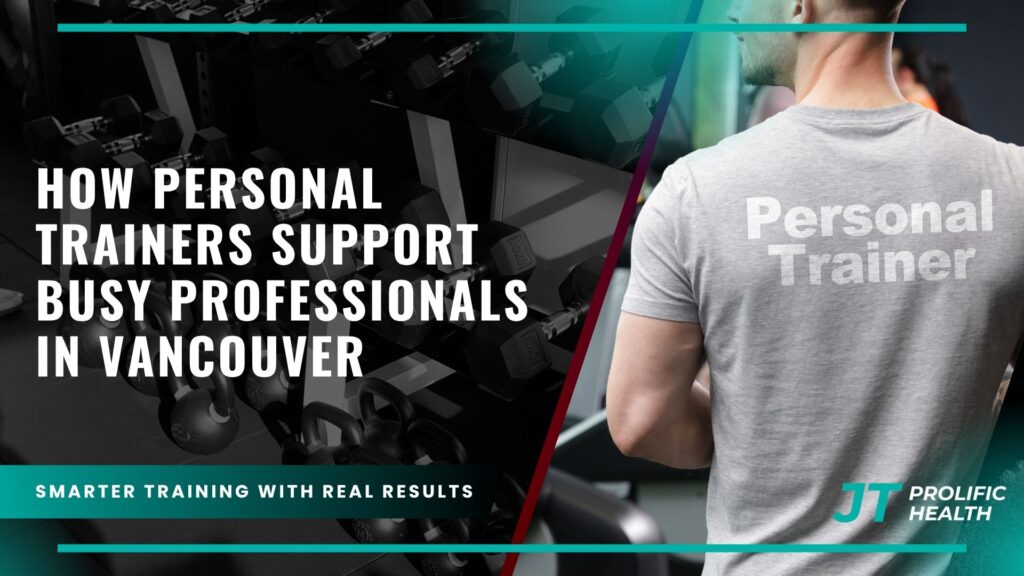In Vancouver’s fast-paced business environment, maintaining physical fitness often becomes a casualty of demanding work schedules, long commutes, and endless meetings. Busy professionals find themselves caught in a cycle where career success comes at the expense of personal health, leading to decreased energy, increased stress, and diminished overall well-being. The challenge isn’t just finding time to exercise—it’s knowing how to maximize limited time for optimal results while navigating the complexities of proper form, progressive programming, and sustainable lifestyle changes.
Personal trainers have emerged as essential partners for Vancouver’s working professionals, offering specialized solutions that address the unique challenges of maintaining fitness within a demanding career framework. These fitness professionals understand that busy executives, entrepreneurs, and corporate employees need more than generic workout routines—they require strategic, time-efficient approaches that integrate seamlessly with professional obligations while delivering measurable results.
The relationship between personal trainers and busy professionals extends far beyond traditional exercise instruction. Today’s fitness professionals serve as accountability partners, lifestyle consultants, and wellness strategists who help clients navigate the complex intersection of career demands and health goals. They provide personalized solutions that accommodate irregular schedules, travel requirements, and the mental fatigue that often accompanies high-stress professional environments.
Vancouver’s competitive business landscape demands peak performance from its professionals, making physical fitness not just a personal goal but a professional necessity. Personal trainers recognize this reality and have adapted their services to meet the specific needs of time-constrained clients who require maximum efficiency from every workout session. Through customized programming, flexible scheduling, and comprehensive lifestyle support, these fitness professionals help busy individuals achieve sustainable health improvements without compromising career advancement.
The investment in personal training represents more than just fitness guidance—it’s a strategic decision that impacts productivity, stress management, energy levels, and long-term career sustainability. Understanding how personal trainers specifically support busy professionals in Vancouver reveals the multifaceted value these partnerships provide in today’s demanding work environment.
Key Takeaways
- Time-Efficient Training Programs: Personal trainers design high-intensity, results-focused workouts that maximize fitness gains within limited timeframes, typically 30-45 minutes per session, making them ideal for professionals with packed schedules.
- Flexible Scheduling Solutions: Vancouver personal trainers offer early morning, lunch break, and evening sessions, along with virtual training options that accommodate unpredictable work schedules and travel requirements common in professional careers.
- Stress Management Integration: Professional trainers incorporate stress-reduction techniques, mindfulness practices, and recovery protocols specifically designed to counteract the physical and mental demands of high-pressure work environments.
- Accountability and Consistency: Regular training appointments create structured fitness routines that busy professionals struggle to maintain independently, ensuring consistent progress despite competing priorities and time constraints.
- Comprehensive Lifestyle Coaching: Beyond exercise instruction, trainers provide nutrition guidance, sleep optimization strategies, and energy management techniques that enhance overall professional performance and well-being.
- Injury Prevention Focus: Personal trainers address postural issues, repetitive strain injuries, and muscular imbalances common among desk workers, preventing costly health problems that could impact career productivity.
- Energy and Productivity Enhancement: Strategic fitness programming improves cardiovascular health, mental clarity, and sustained energy levels, directly contributing to enhanced professional performance and career advancement opportunities.
- Long-term Health Investment: Personal training establishes sustainable fitness habits that protect against chronic diseases, reduce healthcare costs, and ensure long-term career viability through maintained physical and mental health.
Understanding the Professional Fitness Challenge

Vancouver’s business professionals face a unique set of obstacles when attempting to maintain consistent fitness routines. The city’s competitive corporate environment, combined with lengthy commutes and demanding work cultures, creates a perfect storm of challenges that make traditional gym memberships and self-directed fitness programs largely ineffective for busy individuals.
The typical professional’s day begins early with preparation for work, followed by commutes that can extend well beyond an hour in Vancouver’s traffic-congested streets. Once at the office, back-to-back meetings, project deadlines, and client demands consume mental and physical energy, leaving little motivation for exercise at day’s end. This cycle repeats throughout the week, with weekends often occupied by work spillover, family obligations, and the basic maintenance tasks that accumulate during busy workweeks.
Traditional fitness approaches fail busy professionals because they require significant time investments for research, planning, and trial-and-error learning. Self-directed gym routines often lack the intensity and progression necessary for meaningful results within limited timeframes. Additionally, the mental fatigue associated with decision-making throughout the workday leaves many professionals unwilling to make additional choices about exercise selection, workout structure, or program modifications.
The physical demands of professional work create additional complications that generic fitness programs don’t address. Prolonged sitting, repetitive computer work, and stress-related tension patterns require specialized attention that goes beyond standard exercise routines. Many professionals develop postural imbalances, tight hip flexors, rounded shoulders, and weakened posterior chain muscles that need targeted correction before traditional strength training can be effective.
Personal trainers understand these multifaceted challenges and position themselves as comprehensive solutions rather than simple exercise instructors. They recognize that busy professionals need efficiency, expertise, and accountability wrapped into a service that integrates seamlessly with demanding career requirements. This understanding forms the foundation for specialized training approaches that address both immediate fitness goals and long-term health sustainability.
Time-Optimized Training Methodologies


Personal trainers serving Vancouver’s professional community have mastered the art of time-efficient programming that delivers maximum results within minimal timeframes. These specialized approaches recognize that busy professionals typically have 30-45 minute windows for exercise, requiring every minute to contribute meaningfully toward fitness goals. High-intensity interval training (HIIT), compound movement patterns, and circuit-based programming form the backbone of these time-optimized methodologies.
The science behind time-efficient training lies in exercise selection that targets multiple muscle groups simultaneously while elevating heart rate for cardiovascular benefits. Personal trainers design workouts featuring compound movements like squats, deadlifts, push-ups, and rowing variations that engage large muscle groups and create significant metabolic demands. These exercises provide strength, cardiovascular, and functional benefits within single movements, maximizing the return on time investment.
Interval training protocols allow personal trainers to compress the benefits of longer workout sessions into shorter timeframes. By alternating between high-intensity work periods and brief recovery intervals, trainers can help clients achieve cardiovascular improvements, fat loss, and metabolic enhancement that traditionally required much longer exercise sessions. These protocols are particularly effective for busy professionals who need to see tangible results quickly to maintain motivation and program adherence.
Periodization strategies ensure that time-limited training sessions continue producing results over extended periods. Personal trainers manipulate training variables like intensity, volume, and exercise selection to prevent plateaus and maintain progressive overload despite time constraints. This systematic approach prevents the stagnation that often occurs when busy professionals attempt to maintain identical routines week after week.
Functional movement integration ensures that training time addresses the specific physical demands and limitations of professional work. Trainers incorporate exercises that counteract prolonged sitting, improve posture, and enhance movement quality in ways that directly translate to improved comfort and performance during work hours. This dual-purpose approach makes every training minute serve both fitness and professional performance goals.
Recovery and regeneration techniques are woven throughout training sessions to address the cumulative stress of demanding careers. Personal trainers include mobility work, breathing exercises, and stress-reduction techniques within workout timeframes, ensuring that training sessions contribute to overall well-being rather than adding to existing stress loads. When working with professionals, understanding proper movement patterns and skill development becomes crucial for maximizing limited training time while ensuring long-term success.
Flexible Scheduling and Accessibility Solutions


The success of personal training for busy professionals hinges largely on accessibility and scheduling flexibility that accommodates unpredictable work demands. Vancouver personal trainers have developed innovative approaches to service delivery that remove traditional barriers preventing professionals from maintaining consistent fitness routines. These solutions range from unconventional training times to location flexibility that meets clients where they are, when they’re available.
Early morning training sessions have become increasingly popular among Vancouver professionals who recognize that exercising before work commitments begin ensures consistency and provides energy for demanding days ahead. Personal trainers accommodate clients as early as 5:30 AM, understanding that morning workouts often represent the only guaranteed time slot that won’t be compromised by work emergencies, late meetings, or client demands. These early sessions require trainers to be exceptionally prepared and energetic, setting a positive tone that carries clients through their professional day.
Lunch break training represents another innovative solution that maximizes limited time windows. Trainers design 30-minute high-intensity sessions that include brief warm-up and cool-down periods, allowing clients to exercise and return to work within standard lunch timeframes. These midday sessions provide energy boosts that combat afternoon fatigue while offering mental breaks from work-related stress. Some trainers even provide post-workout nutrition guidance to ensure clients refuel appropriately for afternoon productivity.
Virtual training platforms have revolutionized accessibility for traveling professionals and those with extremely unpredictable schedules. Through video conferencing technology, personal trainers can deliver live, interactive sessions regardless of client location. These virtual sessions maintain the accountability and expertise benefits of in-person training while eliminating travel time and location constraints. Trainers provide equipment recommendations for home or hotel room workouts, ensuring consistency even during business travel.
On-site corporate training services bring personal training directly to workplace environments, eliminating commute time and making fitness more accessible for entire professional teams. Some Vancouver trainers partner with companies to provide on-site fitness services, utilizing conference rooms, outdoor spaces, or dedicated office fitness areas. These programs often include group sessions that build team camaraderie while addressing individual fitness needs.
Flexible cancellation and rescheduling policies acknowledge the reality of professional life, where urgent meetings, client emergencies, and travel changes can disrupt planned training sessions. Successful trainers build buffer time into their schedules and offer same-day rescheduling options that accommodate the unpredictable nature of business demands. This flexibility removes the guilt and financial penalty often associated with missed appointments, encouraging long-term program adherence. For professionals seeking this type of personalized service, our comprehensive guide to finding qualified trainers can help identify professionals who offer the flexibility needed for busy schedules.
Stress Management and Recovery Integration
Personal trainers working with Vancouver’s busy professionals understand that exercise must serve dual purposes: improving physical fitness while actively counteracting the stress and tension accumulated during demanding workdays. This requires sophisticated programming that goes beyond traditional strength and cardiovascular training to include stress management techniques, recovery protocols, and mental wellness strategies that address the holistic needs of high-performing individuals.
Chronic stress from professional demands creates physiological changes that impact exercise response, recovery capacity, and overall health outcomes. Elevated cortisol levels, disrupted sleep patterns, and constant mental stimulation require specialized training approaches that support rather than further stress the nervous system. Personal trainers modify exercise intensity, incorporate stress-reducing activities, and time training sessions to optimize hormonal responses and promote recovery from work-related stress.
Breathing techniques and mindfulness practices are seamlessly integrated into training sessions to provide immediate stress relief while teaching valuable skills for workplace application. Trainers guide clients through diaphragmatic breathing exercises during rest periods, helping activate parasympathetic nervous system responses that counteract chronic stress patterns. These techniques can be practiced discretely during work hours, providing professionals with tools for real-time stress management throughout their careers.
Recovery-focused training sessions specifically address the physical manifestations of professional stress, including muscle tension, postural imbalances, and movement restrictions. Trainers incorporate targeted stretching, self-massage techniques using foam rollers and massage balls, and corrective exercises that address common problem areas like tight hip flexors, rounded shoulders, and cervical spine tension. These sessions provide both physical relief and mental relaxation that busy professionals rarely experience elsewhere.
Sleep optimization strategies form a crucial component of stress management programming, as busy professionals often sacrifice sleep quality for work productivity. Personal trainers educate clients about sleep hygiene, evening routines that promote relaxation, and the timing of exercise to support rather than disrupt sleep patterns. They may recommend avoiding high-intensity training close to bedtime while suggesting gentle movement or stretching routines that prepare the body for restorative sleep.
Nutrition counseling addresses stress eating patterns, energy management throughout long workdays, and the use of food as fuel rather than comfort. Trainers help professionals develop sustainable eating strategies that support energy levels, reduce inflammation, and provide the nutrients necessary for stress resilience. This includes practical guidance for business meals, travel nutrition, and quick meal preparation that fits busy schedules. Understanding the broader picture of trainer qualifications, including their ability to provide comprehensive lifestyle guidance, is essential when evaluating potential fitness professionals for stress management support.
Mental health awareness and emotional support provide additional value that extends beyond physical training. Experienced trainers recognize signs of burnout, excessive stress, and mental fatigue, offering appropriate support and referrals when necessary. The training environment becomes a safe space where professionals can decompress, express frustrations, and receive encouragement from someone invested in their overall well-being rather than just their work output.
Accountability Systems and Habit Formation
The accountability provided by personal trainers represents one of the most valuable services for busy professionals who struggle to maintain consistency in self-directed fitness programs. Professional environments often lack external accountability for personal health decisions, making it easy for fitness goals to be repeatedly postponed in favor of immediate work demands. Personal trainers create structured accountability systems that ensure fitness remains a priority despite competing professional obligations.
Scheduled training appointments function as non-negotiable commitments that create external pressure for consistency. Unlike gym memberships that can be ignored without immediate consequences, personal training sessions represent financial investments and scheduled commitments that encourage attendance even when motivation is low. This external structure helps busy professionals maintain exercise consistency during periods of high work stress when self-motivation typically fails.
Progress tracking and regular assessments provide objective feedback that keeps professionals engaged with their fitness goals. Trainers document workout performance, body composition changes, strength improvements, and energy level reports, creating tangible evidence of progress that busy individuals might otherwise overlook. These metrics provide motivation during challenging periods and help professionals understand the connection between fitness investments and improved work performance.
Goal setting and milestone celebrations create positive reinforcement cycles that support long-term habit formation. Personal trainers help professionals establish realistic, measurable objectives that align with their lifestyle constraints and career demands. Breaking larger goals into smaller, achievable milestones provides regular success experiences that build confidence and momentum toward lasting behavior change.
Communication systems extend accountability beyond scheduled training sessions through check-ins, progress updates, and ongoing support. Many trainers use messaging apps, email follow-ups, or brief phone calls to maintain connection with clients throughout the week. These touchpoints provide opportunities to address challenges, celebrate successes, and make real-time adjustments to programs based on changing work demands or energy levels.
Habit stacking techniques help professionals integrate fitness activities into existing routines, making exercise feel less like an additional burden and more like a natural part of daily life. Trainers identify existing habits and routines, then attach small fitness activities to these established patterns. This might include desk stretches after specific meetings, walking meetings when possible, or brief movement breaks tied to existing calendar reminders.
Social accountability through group training or partner sessions creates additional motivation layers that many professionals find valuable. Training with colleagues or other professionals provides peer support, friendly competition, and shared commitment that extends beyond the trainer-client relationship. These social connections often lead to workplace wellness initiatives and ongoing support networks that reinforce healthy habits throughout professional communities. For professionals seeking trainers who excel in creating these accountability systems, understanding the comprehensive lifestyle approaches that quality trainers provide can guide selection decisions.
Prolific Health: Supporting Vancouver’s Professional Community
Prolific Health has established itself as a leading provider of personal training services specifically designed for Vancouver’s busy professional community. Understanding the unique challenges faced by executives, entrepreneurs, and corporate employees, Prolific Health has developed specialized programs that address the intersection of career demands and health goals. Their approach recognizes that successful professionals need more than generic fitness guidance—they require strategic, time-efficient solutions that integrate seamlessly with demanding work schedules.
The team at Prolific Health consists of certified personal trainers who have extensive experience working with high-achieving individuals who value efficiency, results, and professionalism. These trainers understand the mental and physical demands of corporate environments, allowing them to design programs that not only improve fitness but also enhance work performance, stress management, and overall quality of life. Their expertise extends beyond exercise instruction to include lifestyle coaching, nutrition guidance, and stress management strategies specifically tailored for professional environments.
Prolific Health’s flexible service delivery options accommodate the unpredictable schedules common in professional careers. They offer early morning sessions for professionals who prefer to exercise before work commitments begin, lunch break training for those seeking midday energy boosts, and evening sessions for individuals with more traditional schedules. Additionally, their virtual training platform ensures that clients can maintain consistency even during business travel or when working from home.
The company’s commitment to results-driven programming means that every training session is designed to maximize time efficiency while delivering measurable improvements in strength, cardiovascular health, and overall well-being. Their trainers utilize evidence-based methodologies that compress the benefits of longer workout sessions into time frames that fit professional schedules, typically 30-45 minutes per session.
Prolific Health also provides comprehensive support that extends beyond scheduled training sessions. Their trainers offer ongoing communication, progress tracking, and lifestyle guidance that helps professionals maintain healthy habits throughout demanding work weeks. This holistic approach recognizes that sustainable fitness results require addressing all aspects of a professional’s lifestyle, from sleep and nutrition to stress management and recovery strategies.
Frequently Asked Questions
How much time do I need to commit to see results with personal training?
Most busy professionals see significant improvements with just 2-3 training sessions per week, lasting 30-45 minutes each. Personal trainers design high-intensity, efficient workouts that maximize results within these limited timeframes. The key is consistency rather than duration—regular short sessions typically produce better results than sporadic longer workouts.
Can personal trainers accommodate my unpredictable work schedule?
Yes, experienced trainers understand the demands of professional life and offer flexible scheduling options including early morning sessions, lunch break training, and same-day rescheduling when work emergencies arise. Many also provide virtual training options for times when you can’t make it to the gym or are traveling for business.
What should I look for when choosing a personal trainer as a busy professional?
Focus on trainers who have experience working with professionals and understand time constraints. Look for relevant certifications, flexible scheduling options, and a proven track record of helping clients achieve results efficiently. It’s also important to find someone who offers comprehensive lifestyle support beyond just exercise instruction. For detailed guidance on this selection process, consider reviewing essential trainer qualifications that ensure you’re working with a qualified professional.
How do personal trainers help with work-related stress and tension?
Personal trainers incorporate stress management techniques, breathing exercises, and targeted stretches that address common issues like neck tension, tight shoulders, and lower back pain from prolonged sitting. They also design programs that help regulate stress hormones and improve sleep quality, which directly impacts your ability to handle work pressure.
Is personal training worth the investment for busy professionals?
The investment in personal training often pays for itself through improved energy levels, reduced sick days, better stress management, and enhanced productivity at work. Many professionals find that the time saved through efficient, expert-guided workouts and the health benefits gained make personal training a valuable investment in their career longevity and quality of life.
Can I maintain my fitness routine while traveling for business?
Yes, personal trainers can provide travel workout plans, virtual training sessions, and equipment-free routines that work in hotel rooms or small spaces. They also offer guidance on maintaining healthy habits while traveling, including nutrition strategies and stress management techniques for business trips.
How quickly can I expect to see improvements in my energy and work performance?
Many professionals notice improved energy levels and mental clarity within 2-3 weeks of starting a consistent training program. Physical changes like increased strength and improved body composition typically become apparent within 4-6 weeks, while significant transformations usually occur over 3-6 months of consistent training.
What red flags should I avoid when selecting a personal trainer?
Be cautious of trainers who promise unrealistic results, lack proper certifications, or don’t understand the demands of professional life. Avoid those who are inflexible with scheduling, don’t listen to your specific needs, or focus only on intense workouts without considering recovery and stress management. For a comprehensive list of warning signs, reviewing common red flags to avoid can help you make an informed decision.
Conclusion
Personal trainers have become essential partners for Vancouver’s busy professionals, offering specialized solutions that address the unique challenges of maintaining fitness within demanding career frameworks. The value they provide extends far beyond traditional exercise instruction, encompassing time-efficient programming, flexible scheduling, stress management, and comprehensive lifestyle support that directly impacts professional performance and long-term health outcomes.
The investment in personal training represents a strategic decision that pays dividends across multiple areas of a professional’s life. Improved energy levels, enhanced stress management capabilities, better sleep quality, and increased physical resilience all contribute to sustained career success and personal satisfaction. For busy professionals struggling to balance career demands with health goals, personal trainers provide the expertise, accountability, and efficiency necessary to achieve meaningful results without compromising professional obligations.
Vancouver’s competitive business environment demands peak performance from its professionals, making physical fitness not just a personal preference but a professional necessity. Personal trainers understand this reality and have adapted their services to meet the specific needs of time-constrained individuals who require maximum return on their fitness investments. Through customized programming, innovative scheduling solutions, and holistic support systems, these fitness professionals help busy individuals achieve sustainable health improvements that enhance both career performance and quality of life.
The future of professional fitness lies in these specialized partnerships that recognize the interconnected nature of physical health and career success. As work demands continue to intensify and the importance of work-life balance becomes increasingly recognized, personal trainers will continue to evolve their services to meet the changing needs of Vancouver’s professional community, ensuring that career success and personal health can coexist and mutually reinforce each other.



